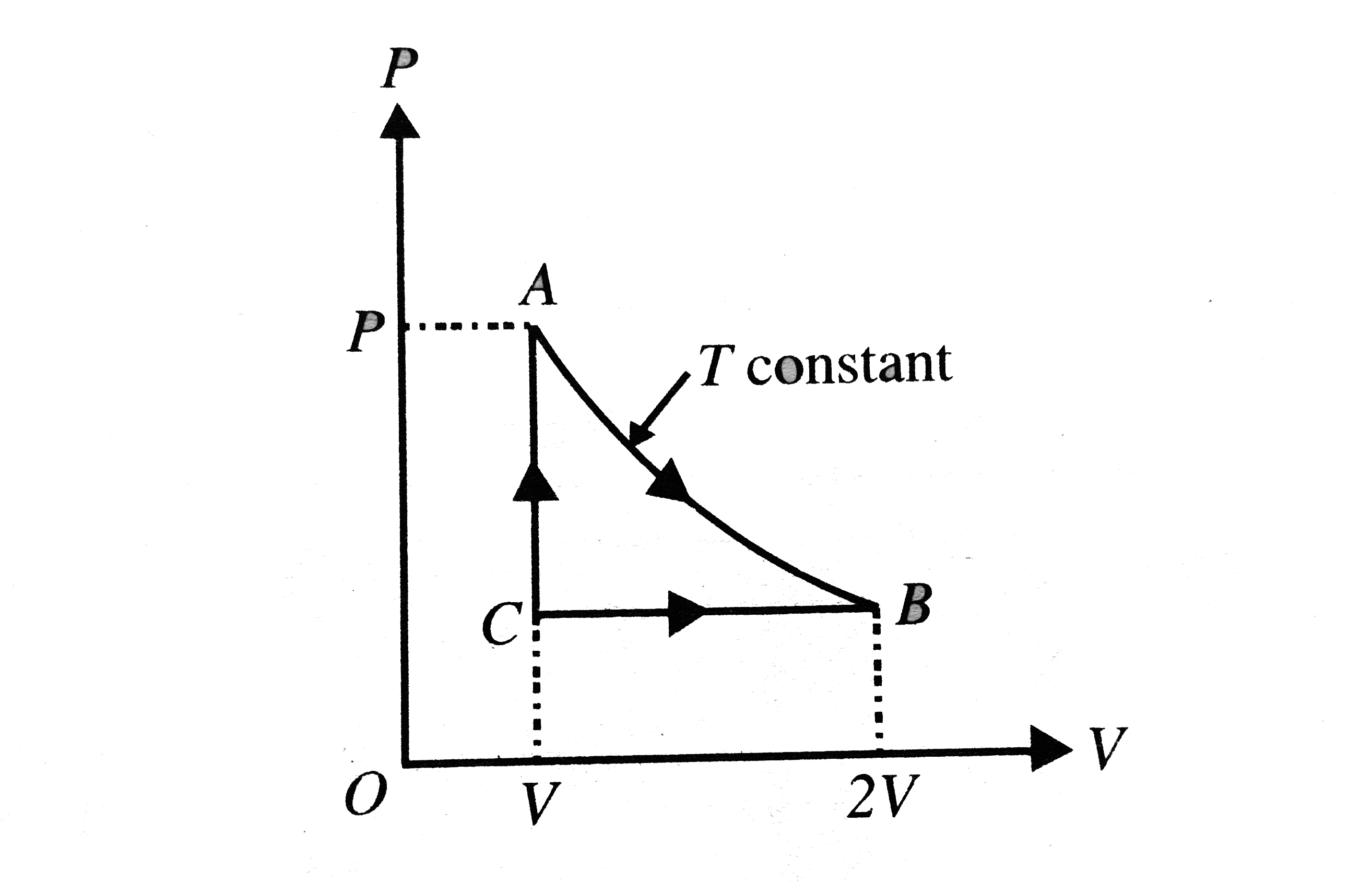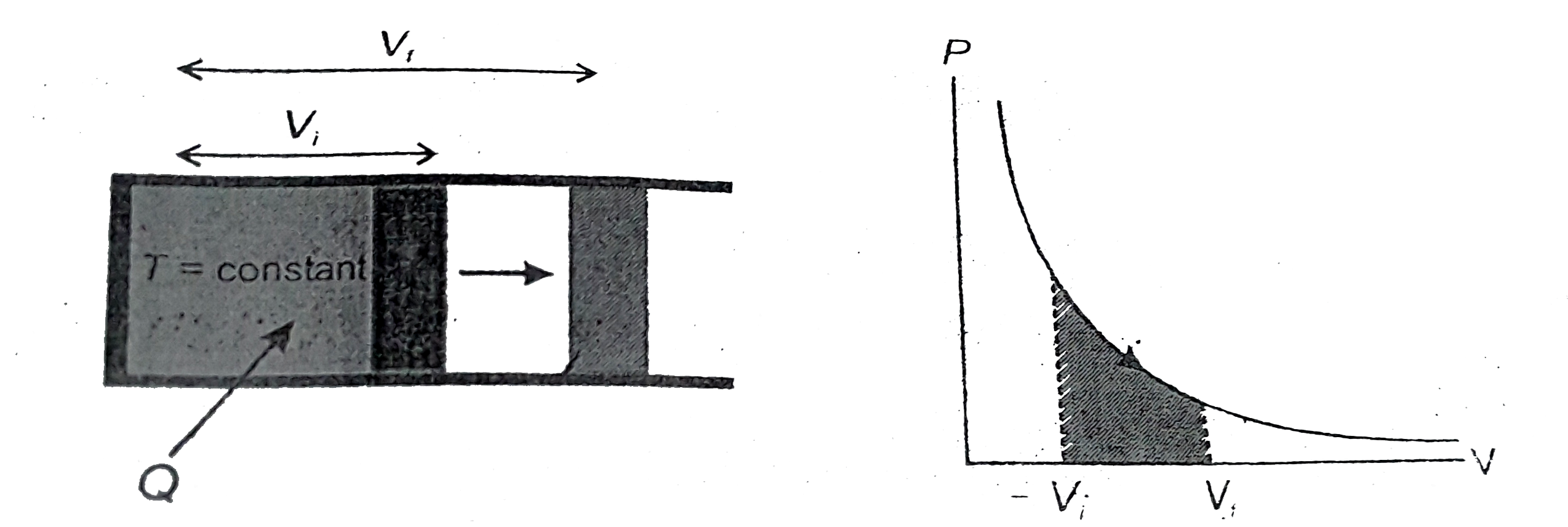One mole of oxygen ( Assume it to be an ideal gas ) expands at a constant temperature T of 310 K from an intital volume Vi of 12L to a final volume Vf of 19 L . How much work is done by the gas during the expansion ?
To solve the problem of calculating the work done by one mole of oxygen gas during an isothermal expansion from an initial volume Vi=12L to a final volume Vf=19L at a constant temperature T=310K, we will use the formula for work done in an isothermal process for an ideal gas.
1. Identify the Formula for Work Done:
The work done W by an ideal gas during an isothermal expansion can be calculated using the formula:
W=nRTln(VfVi)
where:
- n = number of moles of gas
- R = universal gas constant (8.314 J/(mol·K))
- T = absolute temperature in Kelvin
- Vf = final volume
- Vi = initial volume
2. Substitute the Given Values:
We know:
- n=1mole
- R=8.314J/(mol⋅K)
- T=310K
- Vi=12L
- Vf=19L
Substitute these values into the formula:
W=1×8.314×310ln(1912)
3. Calculate the Natural Logarithm:
First, calculate the ratio of the volumes:
VfVi=1912≈1.5833
Now calculate the natural logarithm:
ln(1.5833)≈0.458
4. Calculate the Work Done:
Now substitute this value back into the work done formula:
W=1×8.314×310×0.458
Calculate:
W≈8.314×310×0.458≈1250.5J
5. Final Result:
Therefore, the work done by the gas during the expansion is approximately:
W≈1250.5J
The work done W by an ideal gas during an isothermal expansion can be calculated using the formula:
W=nRTln(VfVi)
where:
- n = number of moles of gas
- R = universal gas constant (8.314 J/(mol·K))
- T = absolute temperature in Kelvin
- Vf = final volume
- Vi = initial volume
We know:
- n=1mole
- R=8.314J/(mol⋅K)
- T=310K
- Vi=12L
- Vf=19L
W=1×8.314×310ln(1912)
First, calculate the ratio of the volumes:
VfVi=1912≈1.5833
Now calculate the natural logarithm:
ln(1.5833)≈0.458
Now substitute this value back into the work done formula:
W=1×8.314×310×0.458
Calculate:
W≈8.314×310×0.458≈1250.5J
Therefore, the work done by the gas during the expansion is approximately:
W≈1250.5J
Topper's Solved these Questions
- BOOK - RESNICK AND HALLIDAYCHAPTER - THE FIRST LAW OF THERMODYNAMICSEXERCISE - CHECK POINT8videos
THE FIRST LAW OF THERMODYNAMICS
- BOOK - RESNICK AND HALLIDAYCHAPTER - THE FIRST LAW OF THERMODYNAMICSEXERCISE - PROBLEMS41videos
THE FIRST LAW OF THERMODYNAMICS
- BOOK - RESNICK AND HALLIDAYCHAPTER - TEMPERATURE, ZEROTH LAW OF THERMODYNAMICS AND THERMAL EXPANSION EXERCISE - PRACTICE QUETIONS (Integer Type)4videos
TEMPERATURE, ZEROTH LAW OF THERMODYNAMICS AND THERMAL EXPANSION
- BOOK - RESNICK AND HALLIDAYCHAPTER - THE KINETIC THEORY OF GASESEXERCISE - PRACTICE QUESTIONS72videos
THE KINETIC THEORY OF GASES
Similar Questions
One mole of a gas is carried through the cycle shown in Fig. The gas expands at constant temperature T from volume V to 2V. It is them compressed to the initial volume at constant pressure and is finally brought back to its original state by heating at constant volume. Calculate the work done by the gas in complete cycle.
 View Solution
View SolutionHow much heat is absorbed aif this system expands against a constant external pressure of 1 atm and expansion is carried out from 2.5L to final volume of 12.5L reversibly?
View Solution
Knowledge Check
- Question 1 - Select One
One mole of an ideal gas expands at a constant temperature of 300 K from an initial volume of 10 litre to a final volume of 20 litre.The work done in expanding the gas is
A750 JouleB1728 JouleC1500 JouleD3456 Joule - Question 2 - Select One
One mole of an ideal gas expands at a constant temperature of 300K from an initial volume of 10 litres to a final volume of 20 liters. The work done in expanding the gas is (R=8.31J/mole−K) (in joules)
A750B1728C1500D3456 - Question 3 - Select One
A one mole of an an ideal gas expands adiabatically at constant pressure such that its temperature T∝1√V.
A1.3B1.5C1.4D2.0
A cylinder contains 0.50 mol of an ideal gas at temperature of 310 K. as the gas expands isothermally from an initial volume of 0.31 m3 to a final volume of 0.45m3, find the amount of heat that must be added to the gas in order to maintain a constant temperature.
 View Solution
View SolutionThe volume of one mole of an ideal gas changes from V to 2V at temperature 300 K. If R is universal gas constant, then work done in this process is
View SolutionIf 1.5 L of an ideal gas at a apressure of 20 atm expands isothermally and reversibly to a final volume of 15 L, the work done by the gas in L atm is:
View SolutionWhat is the entropy change when 1 mole oxygen gas expands isothermally and reversibly from an initial volume of 10 L to 100 L at 300 K ?
View SolutionOne mole of an ideal gas is allowed to expand reversible and adiabatically from a temperatureof27∘C)if the work done during the process is3kJ,the final temperature will be equal to(Cv=20JK−1)
View Solution

